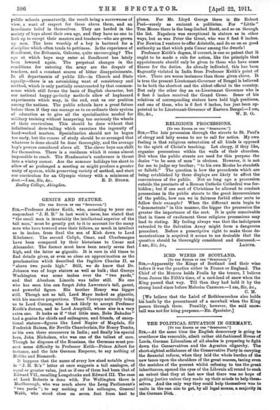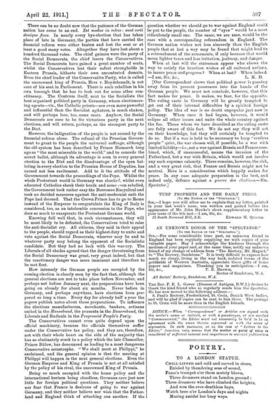THE POLITICAL SITUATION IN GERMANY.
[To THE EDITOR 07 THE "SPECTATOR."] Sra,—At the same time the English democracy is going to overthrow the venerable, albeit rather old-fashioned House of Lords, German Liberalism of all shades is preparing to fight down the Conservatives and the Agrarian oligarchy. The short-sighted selfishness of the Conservative Party in carrying the financial reform, when they laid the whole burden of the new taxes upon the shoulders of the great masses, taxing even the matches of the poorest whilst refusing to tax the great inheritances, opened the eyes of the Liberals all round to such an extent that they at last saw that there was no hope of getting justice unless they made up their minds to help them., selves. And the only way they could help themselves was to unite in the one aim to get, by all legal means, a majority in the German Diet There can be no doubt now that the patience of the German nation has come to an end. Est modus in rebus : sunt certi denique fines. In nearly every bye-election that has taken place of late in Germany, the parties that have carried the financial reform were either beaten and lost the seat or at least a good many votes. Altogether they have lost about a hundred thousand votes. The chief gainers were the party of the Social Democrats, the chief losers the Conservatives. The Social Democrats have gained a great number of seats, whilst the Conservatives lost their safest strongholds in Eastern Prussia, hitherto their own uncontested domain. Even the chief leader of the Conservative Party, who is called the uncrowned king of Prussia, Herr v. Heydebrandt, is not sure of his seat in Parliament. There is such rebellion in his own borough that he has to look out for some other con- stituency. The Centrum itself, next to the Socialists the best organised political party in Germany, whose electioneer- ing agents—viz., the Catholic priests—are even more powerful and influential than the Socialist agitators, is much shaken, and will perhaps lose, too, some seats. Anyhow, the Social Democrats are sure to be the victorious party in the next elections, and will return, perhaps, as the strongest party to the Diet.
However, the indignation of the people is not roused by the financial reform alone. The refusal of the Prussian Govern- ment to grant to the people the universal suffrage, although the old system has been described by Prince Bismarck long ago as " the most miserable in the world," and to concede the secret ballot, although its advantage is seen in every general election to the Diet and the disadvantage of the open bal- loting in every election to the Prussian House of Deputies, has caused not less excitement. Add to it the attitude of the Government towards the proceedings of the Pope. Whilst the whole Protestant world in Germany was shocked, whilst even educated Catholics shook their heads and some even rebelled, the Government took rather easy the Borromeo Encyclical and took no decided measures against the anti-modernist oath the Pope had decreed. That the Crown Prince has to go to Rome instead of the Emperor to congratulate the King of Italy is considered, too, as an intolerable concession to the Pope, who does so much to exasperate the Protestant German world.
Knowing full well that, in such circumstances, they will be most likely to be defeated, the Conservatives tried to raise the anti-Socialist cry. All citizens, they said in their appeal to the people, should regard as their highest duty to unite and vote against the Social Democrats, whoever may be and to whatever party may belong the opponent of the Socialistic candidate. But they had no luck with this war-cry. The Liberals of all shades agreed that the danger threatening from the Social Democracy was great, very great indeed, but that the reactionary danger was more imminent and therefore to be met first.
How intensely the German people are occupied by the coming election is clearly seen by 'the fact that, although the general elections are not to take place before November, and perhaps not before January next, the preparations have been going on already for about six months. Never before in Germany, and perhaps anywhere, have elections been pre- pared so long a time. Every day for already half a year the papers publish notes about these preparations. To influence the elections manufacturers, merchants, bankers, artisans united in the Hansabund, the peasants in the Bauernbund, the Liberals and Radicals in the Progressist People's Par4.
The Conservatives cannot even quite depend upon the official machinery, because the officials themselves suffer under the Conservative tax policy, and they are, therefore, not with their whole heart on the side of the majority that has so obstinately stuck to a policy which the late Chancellor, Prince Billow, has denounced as leading to a most dangerous Conservative catastrophe. " We shall meet at Philippi," he exclaimed, and the general opinion is that the meeting at Philippi will happen in the next general elections. Even the German Emperor and King of Prussia is not at all satisfied by the policy of his rival, the uncrowned King of Prussia.
Being so much occupied with the home policy and the international horizon being cloudless, Germans care just now little for foreign political questions. They neither believe nor fear that France is desirous of going to war against Germany, and they neither believe nor wish that the Father- land and England think of attacking one another. If the question whether we should go to war against England could be put to the people, the number of "ayes " would be a most ridiculously small one. The same, we are sure, would be the case with a corresponding referendum in England. The German nation wishes not less sincerely than the English people that at last a way may be found that might lead to a retrenchment of the armaments, if only because that would mean lighter taxes and less irritation, jealousy, and danger.
When at last will the statesman appear who shows the way to satisfy the heartiest wishes of all cultured nations, to insure peace and progress ? When at last? When indeed.
[Our Correspondent shows that political power is passing away from its present possessors into the hands of the German people. We must not conclude, however, that this fact makes for peace. It makes, we fear, for the opposite. The ruling caste in Germany will be greatly tempted to get out of their internal difficulties by a spirited foreign policy. The idea of war is no doubt unpopular just now in Germany. When once it had begun, however, it would eclipse all other issues and unite the whole country against the foe. Those whom we have described as the ruling caste are fully aware of this fact. We do not say they will act on their knowledge, but they will certainly be tempted to do so. But if a war is held to be necessary to keep " restless people " quiet, the war chosen will, if possible, be a war with limited liability—i.e., not a war against Russia and France com- bined, which, if unsuccessful, means the invasion of the Fatherland, but a war with Britain, which would not involve any such supreme calamity. There remains, however, the risk, and a very great risk, that France and Russia might not be neutral. Here is a consideration which happily makes for peace. In any case adequate preparation is the best, and indeed only, defence against a guerre des acctions.—En. Spectator.]







































 Previous page
Previous page